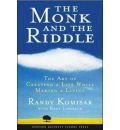 Summary
Summary
It’s a question most of us consider only hypothetically-opting instead to “do what we have to do” to earn a living. But in the critically acclaimed bestseller The Monk and the Riddle, entrepreneurial sage Randy Komisar asks us to answer it for real. The book’s timeless advice-to make work pay not just in cash, but in experience, satisfaction, and joy-will be embraced by anyone who wants success to come not just from what they do, but from who they are. At once a fictional tale of Komisar’s encounters with a would-be entrepreneur and a personal account of how Komisar found meaning not in work’s rewards but in work itself, the book illustrates what’s wrong with the mainstream thinking that we should sacrifice our lives to make a living. Described by Fortune.com as “part personal essay, part fictional narrative and part meditation on the nature of work and life,” The Monk and the Riddle is essential reading on the art of creating a life while making a living.
Review
In this short book, Randy Komisar delves into the mysterious venture capital industry located in Silicon Valley. He does this by creating a hypothetical example of a man who is pitching an online funeral business. He is eager to make millions and has the business savvy to pull it off. Komisar takes you through stories of his life to illustrate the path to success in starting a business. It boils down to one thing: passion. You need to start something where you don’t want to go to sleep because it will take time away from your business. Your sole motivation is not the end sale but the journey. Komisar accomplishes this very effectively through his fantastic storytelling.
My favorite aspect of the book: The author does a superb job of inspiring you with his message instead of merely stating it. You are taken into this world where you slowly start to absorb many of his lessons as you follow the hypothetical character. Many of you will have heard the message “Don’t do it for the money” by the time you read the book. He makes you believe it.
My least favorite aspect of the book: The book does tend to gloss over some of the more complex difficulties in starting a business. It is possible a reader may consider entrepreneurship without fully understanding the rigor needed to succeed. I do not think he could have addressed this area without unnecessarily elongating the book so it may have been intentional. Nevertheless, it is a caveat worth noting.
Nikolai’s Rating: 4 stars
